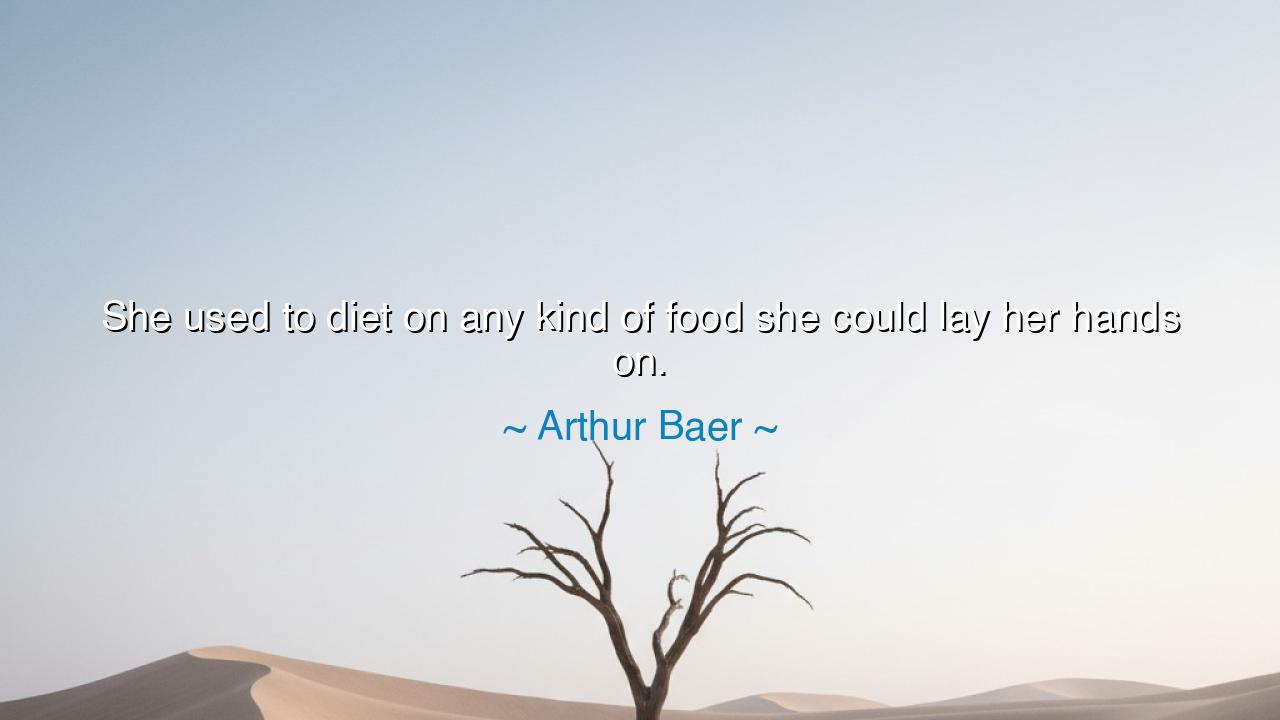
She used to diet on any kind of food she could lay her hands on.






The humorist Arthur Baer, with his gift for wit cloaked in wisdom, once wrote: “She used to diet on any kind of food she could lay her hands on.” Though it may seem light, even mocking on the surface, this line holds within it a deep and enduring truth about human nature. For behind the laughter lies a mirror — a reflection of the soul’s confusion, the endless struggle between desire and discipline, between knowing what we ought to do and doing what we actually do. Baer’s words, though spoken in jest, are a gentle satire on mankind’s eternal tendency to seek transformation without sacrifice, to crave the fruits of change while clinging to the comforts of habit.
In those few playful words — “diet on any kind of food” — we glimpse a contradiction as old as civilization itself. Humanity has forever sought balance, yet walked the crooked path toward it. The woman of Baer’s tale is not merely one person, but all of us. We wish to be pure yet indulge in excess; we long to be strong but refuse the discipline that strength demands. Her “diet,” then, is not a meal plan, but a metaphor — a portrait of the self-deception that often accompanies our noble intentions. We promise ourselves improvement while secretly feeding the very habits that make us weak.
In ancient Greece, there lived a philosopher named Diogenes, who mocked the hypocrisy of men who preached moderation but feasted in secret. He carried a lamp through the streets of Athens, saying, “I am looking for an honest man.” Yet perhaps what he sought was not honesty with others, but honesty with oneself. For the greatest delusion is self-delusion — when we dress indulgence in the robes of virtue. The woman in Baer’s quote “diets” not from hunger of the body, but hunger of identity. She wishes to appear restrained while remaining enslaved to appetite. This is the tragedy of much of modern living: the pursuit of image without the cultivation of essence.
But there is also tenderness in Baer’s jest. He reminds us that human weakness is not a flaw to be despised, but a truth to be acknowledged. We stumble not because we are wicked, but because we are divided. The body craves what the mind condemns; the heart yearns for ease even as the soul whispers for growth. The ancients would have called this the war within the self — the battle between the higher and lower nature. To win that war is not to deny joy, but to govern desire, to make pleasure the servant of purpose, not its master.
History tells of Empress Elisabeth of Austria, famed for her beauty and her endless attempts to preserve it. She was obsessed with thinness, with “dieting,” yet often lived on little more than sweets and milk. Her struggle was not hunger of the body, but hunger of control — an echo of the same spirit Arthur Baer so wittily described. She sought perfection through contradiction, and in that contradiction lost her peace. From her story and Baer’s line alike, we learn that discipline without direction becomes despair, and indulgence disguised as discipline leads to self-mockery.
The wisdom, then, is clear: one cannot walk two paths at once. To truly diet, in Baer’s deeper sense, is not merely to restrict food, but to choose one’s nourishment — in body, in thought, in spirit — with integrity. One must eat with awareness, speak with truth, and live with purpose. To “diet on any kind of food” is to wander aimlessly in the marketplace of temptation, never knowing which hunger we truly seek to satisfy. The body may be fed, but the soul remains empty.
Let the lesson of Baer’s jest be remembered not as ridicule, but as revelation: that clarity is the first act of transformation. Choose your path, and walk it wholly. When you eat, eat for strength; when you rest, rest for renewal; when you speak, speak with honesty. Half-hearted effort is the diet of confusion, but wholehearted living is the feast of freedom.
So, children of tomorrow, take this laughter of the ancients as your counsel: do not “diet on any kind of food,” but choose wisely the nourishment of your life. For what you consume — in mind, body, and soul — is what you become. To live deliberately is the truest nourishment of all.






AAdministratorAdministrator
Welcome, honored guests. Please leave a comment, we will respond soon